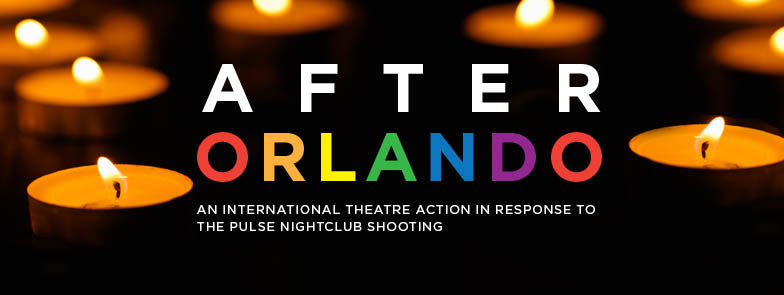
Graphic by Jocelynn White.
On June 12, 2016, the nation’s deadliest mass shooting committed by a single perpetrator killed 50 patrons, and wounded 53 more, at the Pulse gay nightclub in Orlando, Florida.
Theatre artists, with their historically close alliances with LGBTQ communities, responded by making art in historic fashion. Within weeks, two New York City-based production companies reached out to playwrights across the country to create short plays in response to the shootings. More than 70 playwrights responded, including USC School of Dramatic Arts associate dean Oliver Mayer.
These 70-plus plays, collectively called After Orlando, are being performed across the country and globally this fall. Instead of presenting a single staged reading of the plays, as many theatre companies and universities are doing, USC Dramatic Arts has taken an innovative tack. It used its professional sound studio in the McClintock Building to have first year MFA acting students record a dozen of the plays, which are available to be heard on a podcast through December 11, 2016.
https://soundcloud.com/user-166374875/sets/after-orlando-usc
The plays, which vary in time from less than two minutes to six and a half minutes, cover searing, emotional issues – gun violence, anti-Latino prejudice, LGBTQ rights, Islamophobia – as well as personal responses to tragedy, such as a worried mother being unable to sleep and fast food employees providing boxes of chicken to blood donors. Source material included police radio transmissions from the massacre, phrases from victims’ obituaries published in the Orlando Sentinel and the playwrights’ rich imaginations.
Curated by Oliver Mayer and directed by guest artist Jason Aaron Goldberg, the recordings were done in September with the technical assistance of Philip G. Allen, the school’s program director in sound design, and three of his BFA sophomores – Dominic Torquato (recording engineer), Alysha Bermudez and Ethan Zeitman (sound effects). Dean David Bridel recorded introductions to each play.
The MFA acting students who voiced the plays are A.J. Clark, Briyana Guadalupe, Carlos Harrison, Natalia Leyva Lescano, Gabriel Leyva, Bukola Ogunmola, Akshaya Pattanayak, Zaire Martinez Roldan, Malachy Silva, Calahan Skogman, Tessa Hope Slovis and Brett Wyman.
Only in the course of the recording did the actors and professors learn that one of the students, Carlos Harrison, was a cousin of one of the Pulse victims, Jonathan Antonio Camuy Vega. The two grew up together in Puerto Rico. At the time of his death, Vega was working in Florida for Telemundo, where he was on the staff of a popular singing competition, La Voz Kids.
Harrison had not told anyone of his connection to the tragedy before the recording. He said he knew it would be hard for him, but felt strongly that it was important for him to participate as a way to help heal.
He can be heard on the plays Rain and These Wings Are Meant to Fly.
The plays on the podcast are heard in this order:
1. Today is a Good Day – by Katie Pearl
2. Rain – by Korde Tuttle
3. Gone Silent – by SDA faculty member Jennifer Maisel
4. I Hear Gunshots – by SDA alumnus Brian James Polak
5. Fun Fact – by Neil LaBute
6. Sauce – by Sung Rno
7. At The Store with My Daughter – by Rohina Malik
8. Sleep with Me: A Lullaby for Orlando – by Amina Henry
9. After Orlando – by SDA Associate Dean Oliver Mayer
10. These Wings Are Meant to Fly – by Zac Kline
11. Dance On – by Ian Rowlands
12. After – by Caridad Svich
Theatre companies and universities were free to select from the dozens of plays to put together an evening of readings, as well as supplement with their own efforts. Upcoming staged readings of After Orlando in Southern California include:
Nov. 6 – California State University, Long Beach
Nov. 7 – San Diego Repertory Theatre, San Diego
Nov. 15 – The Theatre@Boston Court Performing Arts Center, Pasadena, CA
Dec. 5 – The Road Theatre, Los Angeles
The production companies that organized After Orlando are NoPassport Theatre Alliance and Press, a company that uses wide-scale theatrical events to advocate for social causes, and an independent film and stage production company, Missing Bolts Productions.